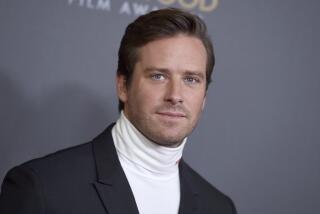$86 Million for Chairman’s Collection : Suits Oppose Use of Oxy Funds for Building Hammer Museum
- Share via
WILMINGTON, Del. — Several Occidental Petroleum Corp. shareholders are seeking to block the oil giant’s plan to spend at least $86 million on a Westwood museum to house Chairman Armand Hammer’s art collection.
One of a pair of lawsuits asks for a preliminary injunction that could immediately stop Oxy’s corporate gifts to the Armand Hammer Museum of Art and Cultural Center, which is under construction on a site next to Occidental’s headquarters. The museum is expected to house Hammer’s extensive collection of paintings and lithographs on completion in the fall of 1990.
Both suits claim that Occidental’s gifts are a waste of corporate assets and glorify the 90-year-old Hammer without significant benefit to the company. “You’ve heard of the poison pill, the white knight and the golden parachute. We’re calling this the golden casket,” said an attorney for one of the plaintiffs.
In a prepared statement, Occidental spokesman Frank Ashley said: “I would refer you to Page 13 of our proxy statement of April 25, which states that a special committee of Occidental’s board of directors, consisting entirely of outside, disinterested directors, approved the charitable contributions for the funding of the museum.”
Bruce Kauffman, a Philadelphia attorney who advised the directors in approving the contributions, said he saw little chance that the suits would block the gifts. “The company meticulously followed the Delaware business judgment rule” approving the gifts, Kauffman said.
The suits were filed in Chancery Court in Delaware, where Occidental is incorporated. Hammer, Occidental and the company’s directors were named as defendants.
In proxy materials related to Occidental’s May 26 annual shareholders’ meeting, the company said it planned to spend about $50 million, rather than an initially budgeted $30 million, to build and help maintain the museum.
In addition, Occidental has already allocated $36 million for an annuity that will provide payments to the institution over 30 years. The company’s first-quarter earnings of $67 million, or 24 cents a share, were reduced by about $24 million, or 8 cents a share, to reflect the after-tax costs of the annuity.
The proxy said Occidental will also give the museum an option to purchase its own complex and the Occidental headquarters building in 30 years for their future estimated fair market value of $55 million, which will be provided by a lump-sum payment from the annuity.
According to one of the suits, however, Occidental doesn’t currently own the property and plans to purchase it under an option later this year for $55 million--exactly the amount the museum can pay for it in 30 years.
An Occidental attorney said the future value was determined by an independent appraiser. The attorney said the property wasn’t expected to appreciate, despite the boom in California real estate, because the existing Occidental headquarters is “quite old” already and could be expected to deteriorate with time.
Trustee Files Suit
The attorney said the gifts had been approved by the outside directors but wouldn’t be finalized for weeks or even months, because the company is completing documents and waiting for approval from the Internal Revenue Service.
The first of the the two suits was filed May 2 by Alan R. Kahn, a New York securities dealer and investment adviser, as trustee for an estate that owns 700 Occidental shares. Kahn declined to comment on the suit. One of his attorneys said no hearing was yet scheduled on the request for a preliminary injunction.
Plaintiffs in the second suit, which was filed on Tuesday, were Joseph Sullivan and Alan I. Brody. William Prickett, a Wilmington attorney representing the pair, described Sullivan and Brody as “average shareholders,” but declined further comment.
Occidental has revealed plans to spend $375,000 on a new book about Hammer and has previously made gifts to pet charities of the executive, such as the Armand Hammer United World College of the American West.
But the $86-million-plus museum gift apparently angered some shareholders because of its sheer size.
Deal Fell Through
Large American corporations have tended to give between 1% and 2% of their annual pretax income to charity, according to annual studies conducted by the New York-based Conference Board. Occidental had $574 million in pretax income in 1988.
Hammer conceived the idea of building the museum after backing out of a promise to give his art collection--which he has claimed to be worth $400 million--to the Los Angeles County Museum of Art. The county museum’s directors had balked at demands by the executive that the collection be kept intact forever and that it be hung on a single floor that would be named for Hammer and supervised not by the museum staff, but by the Armand Hammer Foundation.
In its proxy statement, Occidental said it expected to receive “appropriate public acknowledgement” in return for its gift.
But one of the suits alleges that “the contributions to the Hammer Museum . . . serve no business purpose or corporate interest, and constitute gifts to defendant Hammer.”
More to Read
The biggest entertainment stories
Get our big stories about Hollywood, film, television, music, arts, culture and more right in your inbox as soon as they publish.
You may occasionally receive promotional content from the Los Angeles Times.










